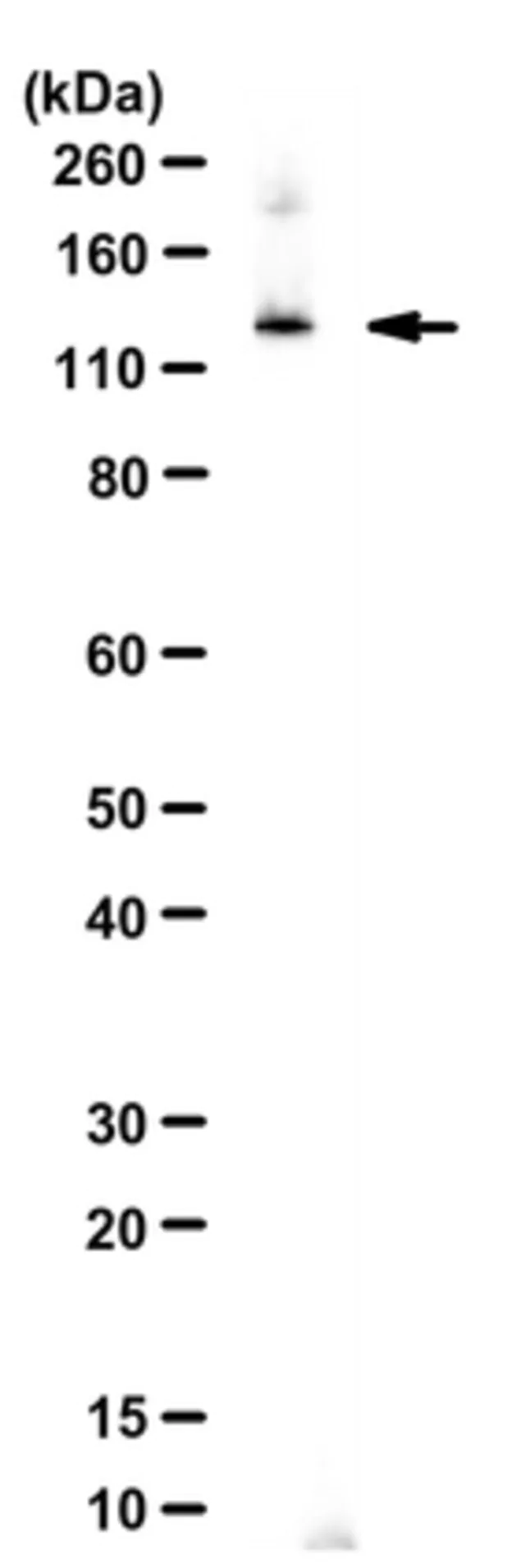您的位置:首页 > 产品中心 > Anti-BAG6 (BAT3)
产品别名
Anti-BAG6 (BAT3)
Large proline-rich protein BAG6, BAG family molecular chaperone regulator 6, BAG-6, BAG6, BCL2-associated athanogene 6, HLA-B-associated transcript 3, Protein G3, Protein Scythe
基本信息
| eCl@ss | 32160702 |
| General description【一般描述】 | Large proline-rich protein BAG6 (UniProt P46379 ; also known as BAG family molecular chaperone regulator 6, BAG-6, BAG6, BCL2-associated athanogene 6, HLA-B-associated transcript 3, Protein G3, Protein Scythe) is encoded by the BAG6 (also known as BAT3, G3) gene (Gene ID 7917) in human. BAG6 is a chaperone that plays a key role in various cellular processes, including apoptosis, insertion of tail-anchored (TA) membrane proteins to the endoplasmic reticulum membrane, and regulation of chromatin. BAG6 is a key component of the BAG6/BAT3 complex, a cytosolic multiprotein complex involved in the post-translational delivery of TA membrane proteins to the endoplasmic reticulum membrane. BAG6/BAT3 complex also regulates the stability and the degradation of proteins by the proteasome and may play a role in immuno-proteasomes to generate antigenic peptides via targeted degradation, thereby playing a role in antigen presentation in immune response. It also plays a role in ubiquitin-mediated proteasomal degradation of proteins of the secretory pathway that are mislocalized to the cytosol. In this regard it binds the mislocalized proteins and promotes their ubiquitination and degradation, thereby prevents their aggregation in the cytosol. It is also involved in DNA damage-induced apoptosis. Following DNA damage, it accumulates in the nucleus and forms a complex with p300/EP300 and enhances p300/EP300-mediated p53/TP53 acetylation leading to increase p53/TP53 transcriptional activity. Ref.: Kawahara, H et al. (2013). J. Biochem. 153, 147-160. Sasaki T et al. (2007). Genes Dev. 21, 848-861. |
| Specificity【特异性】 | ABC1437 corresponds to the rabbit antiserum raised against the Scythe 23 peptide, but not the serum against Scythe 25 peptide by Desmots, F., et al. (2005. Mol. Cell. Biol. 25(23):10329-10337). This antiserum targets a C-terminal region sequence conserved among human, mouse, and rat BAG6 (BAT3). |
| Immunogen【免疫原】 | KLH-conjugated linear peptide corresponding a C-terminal region sequence of human BAG6. |
| Application【应用】 | Immunocytochemistry Analysis: A representative lot detected nuclear BAG6 (Scythe) immunoreactivity in 4% paraformaldehyde-fixed, 0.1% Triton X-100-permeabilized U2OS and OS2000 osteosarcoma cells (Tsukahara, T., et al. (2009). Cancer Sci. 100(1):47-53). Immunofluorescence Analysis: A representative lot detected cytoplasmic BAG6 (Scythe) immunoreactivity in formalin-fixed paraffin-embedded human liver, pancreas, and kidney sections, while both cytoplasmic and nuclear staining was observed in one osteosarcoma biopsy tissue (Tsukahara, T., et al. (2009). Cancer Sci. 100(1):47-53). Western Blotting Analysis: A representative lot detected both nuclear and cytoplasmic BAG6 (Scythe) localization in J774A.1 murine macrophages and bone marrow-derived macrophages. An upregulated BAG6 (Scythe) cyplasmic level and extracellular secretion was detected in both cultures upon ESAT-6 stimulation. Western Blotting Analysis: A representative lot detected BAG6 (Scythe) in lysates from HEK293-EBNA and four human osteosarcoma cell lines, diminished target band was observed in lysates from BAG6 siRNA-transfected cells (Tsukahara, T., et al. (2009). Cancer Sci. 100(1):47-53). Western Blotting Analysis: A representative lot detected BAG6 (Scythe) in MEF and E18.5 kidney lysates from wild-type, but not Bag6-knockout mice (Desmots, F., et al. (2005). Mol. Cell. Biol. 25(23):10329-10337). Detect large proline-rich protein BAG6 using this rabbit polyclonal Anti-BAG6 (BAT3) antibody, Cat. No. ABC1437, validated for use in Immunocytochemistry, Immunofluorescence, and Western Blotting. Research Category Apoptosis & Cancer |
| Quality【质量】 | Evaluated by Western Blotting in human liver tissue lysate. Western Blotting Analysis: A 1:500 dilution of this antiserum detected BAG6 in 10 µg of human liver tissue lysate. |
| Physical form【外形】 | Unpurified. Rabbit polyclonal antibody serum with 0.05% sodium azide. |
| Other Notes【其他说明】 | Concentration: Please refer to lot specific datasheet. |
产品性质
| biological source【生物来源】 | rabbit |
| Quality Level【质量水平】 | 100 |
| antibody form【抗体形式】 | serum |
| antibody product type | primary antibodies |
| clone【克隆】 | polyclonal |
| species reactivity | human, mouse |
| species reactivity (predicted by homology) | rat (based on 100% sequence homology) |
| technique(s) | immunocytochemistry: suitable immunofluorescence: suitable western blot: suitable |
| NCBI accession no.【NCBI登记号】 | NP_004630 |
| UniProt accession no.【UniProt登记号】 | P46379 |
| shipped in【运输】 | dry ice |
产品说明
| Target description【目标描述】 | ~122 kDa observed. 119.4/118.7/122.3/96.80/113.5 kDa (human isoform 1/2/3/4/5), 121.0 kDa (mouse), 120.0/114.6 kDa (rat isoform 1/2) calculated (Met1 removed). Uncharacterized bands may be observed in some lysate(s). |
| Storage and Stability【储存及稳定性】 | Stable for 1 year at -20°C from date of receipt. Handling Recommendations: Upon receipt and prior to removing the cap, centrifuge the vial and gently mix the solution. Aliquot into microcentrifuge tubes and store at -20°C. Avoid repeated freeze/thaw cycles, which may damage IgG and affect product performance. |
| Disclaimer【免责声明】 | Unless otherwise stated in our catalog or other company documentation accompanying the product(s), our products are intended for research use only and are not to be used for any other purpose, which includes but is not limited to, unauthorized commercial uses, in vitro diagnostic uses, ex vivo or in vivo therapeutic uses or any type of consumption or application to humans or animals. |
安全信息
| Storage Class Code【储存分类代码】 | 12 - Non Combustible Liquids |
| WGK | WGK 1 |





